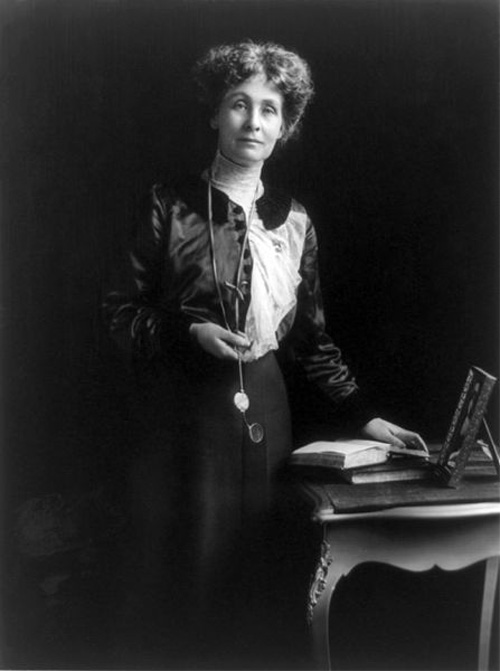Oxford Dictionary of National Biography celebrates the 90th anniversary of the women's vote!

*Freely available in almost all UK public libraries, with direct home access for library members*
14 December 2008 is the 90th anniversary of the election of the first woman to the British House of Commons, and the first election in which women (over 30 years) were able to stand as candidates and to vote. The Oxford Dictionary of National Biography will mark the anniversary with a special feature remembering pioneering political women of the time.
The feature is available, for free, from 1 December 2008 via the dictionary's homepage.
The virtual exhibition includes the biographies of 25 prominent women, ranging from the famous suffragette leader, Emmeline Pankhurst, to Muriel Matters, the campaigner who once showered leaflets from an airship emblazoned with 'Votes for Women'. Other lives include Constance Markievicz, an Irish republican and the first woman to be elected to British parliament, in the 1918 election; the society hostess Nancy Astor, who became the first woman to win and to take up a seat in the Commons; Margaret Haig Thomas, Britain's leading feminist in the interwar period and founder of the feminist journal Time and Tide, as well as the first Labour and Liberal female MPs to enter the House of Commons and to achieve government office.
The feature also includes first-time appointees who, benefiting from anti-discrimination laws in 1919, took up careers previously restricted to men. Pioneering professionals include Ivy Williams, the first woman to be called to the English bar (1922), and Helena Normanton-the first women to take cases in the Old Bailey and the first married woman to be issued a passport in her maiden name (1924).
The 25 women featured in the article are:
- Constance Markievicz - Irish nationalist and first woman to be elected to the House of Commons in December 1918 [also available as a free biography podcast episode]. She conducted her campaign from prison but, as a Sinn Féin candidate, did not take up her seat
- Millicent Garrett Fawcett - Leader of the National Union of Women's Suffrage Societies, known as the suffragists, who campaigned for the vote through parliamentary means
- Emmeline Pankhurst and her daughters Christabel and Sylvia who founded the Women's Social and Political Union (the suffragettes) in 1903 and pursued an increasingly dynamic and imaginative campaign of militancy and unrest in an attempt to force the government to adopt female suffrage
- Muriel Matters - suffragette campaigner who in 1909 showered London with leaflets from an airship emblazoned with ‘Votes for Women'
- Emily Wilding Davison - suffragette militant whose protest at the Epsom Derby (1913) led to her death when she was struck by the king's horse Anmer
- Catherine Marshall and Chrystal Macmillan - 'democratic suffragists' who sought to promote universal suffrage for both men and women (free from all existing property restrictions)
- Eunice Murray - the first woman to stand (unsuccessfully) in a parliamentary election in Scotland in December 1918
- Nancy Astor -the American-born first woman to sit as an MP in the House of Commons, from December 1919; one of only three Americans to sit as an MP to the present day
- Margaret Wintringham - the first Liberal MP elected to the Commons in 1921
- Dorothy Jewson, Susan Lawrence and Margaret Bondfield - the first Labour MPs to enter the Commons in 1924. Bondfield became the first female government minister (1924) and the first woman Cabinet member (as Minister for Labour) at the end of the decade
- Ellen Wilkinson - Labour MP and former suffragist activist elected in 1924
- Georgina Frost - the first woman to hold public office in the UK, as clerk of the petty sessions in Co. Clare
- Ivy Williams - the first woman called to the English bar (1922)
- Margaret Kidd - the first female member of the Faculty of Advocates, the Scottish bar (1923) and the first female King's Counsel in Britain
- Helena Normanton - the first woman to take cases in the Old Bailey, to lead the prosecution in a murder trial, and to hold a passport in her maiden name
- Eleanor Rathbone - campaigner who took over Millicent Garrett Fawcett's NUWSS in 1919; elected to the Commons in 1929, she is best known for promoting state benefits for the family
- Margery Ashby and Eva Hubback - members of Rathbone's National Union of Societies for Equal Citizenship, who educated women in politics after the second extension of the female franchise (1928)
- Alison Neilans - militant suffragette activist who later campaigned against state sanctioned brothels during the twenties
- Margaret Haig, Viscountess Rhondda - Britain's leading feminist in the inter-war period and founder of the influential feminist journal Time and Tide
Four important groups of the time are also included in the feature: the National Union of Women's Suffrage Societies, Women's Social and Political Union, the Women's Freedom League, which campaigned for the vote in parliamentary and illegal ways, and the National League for Opposing Woman Suffrage, the network of men and women who sought to prevent women receiving the vote.
The lives featured in this virtual exhibition, along with the dictionary's 56,646 other subjects, are freely available online in almost all public libraries across Britain, with direct home access for library members. The Oxford DNB currently includes entries on all women MPs who died in or before 2000.
The Oxford DNB, published by Oxford University Press, is updated online three times a year, in January, May, and October. The next online update of the Oxford DNB will be published in January 2009.
For more information please contact:
Katy MacMillan-Scott or Veronique Norton at Colman Getty
Tel: 020 7631 2666
Email: katy@colmangetty.co.uk or Veronique@colmangetty.co.uk

